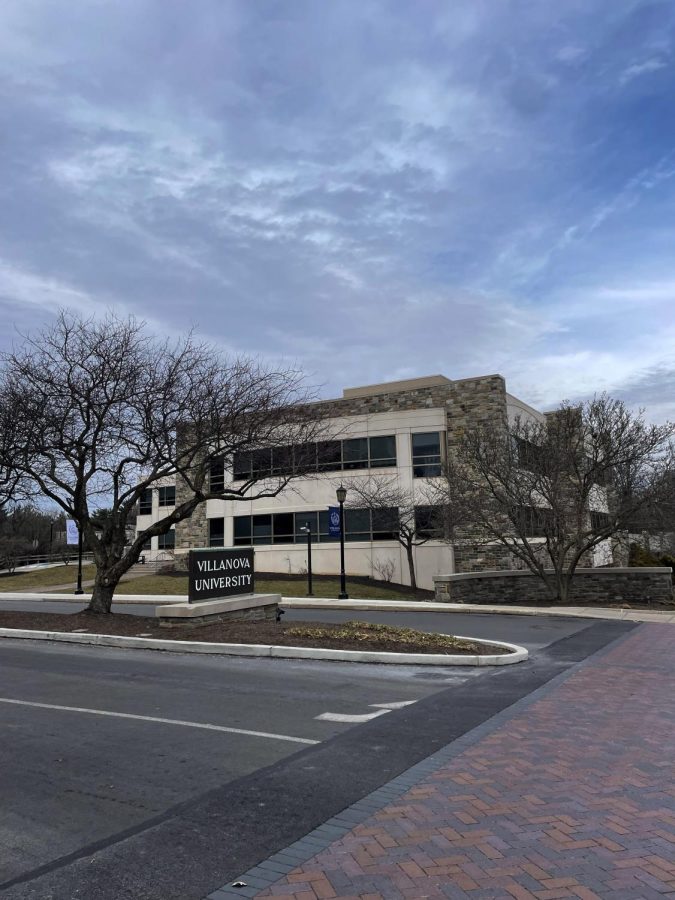Professor Brings Awareness to Stroke Symptoms
Pepper Ritchey/ Villanovan Photography
Villanova’s health center.
March 29, 2023
Defining human life is an arduous task because individuals have different experiences and passions, but we can all agree on the value each life holds. Dr. Robert Leggiadro seeks students and faculty to save more lives by spreading stroke awareness across campus, creating the acronym BEFAST to help remember the symptoms of a stroke.
The BEFAST acronym describes the primary symptoms of stroke: B) Balance, E) Eye changes, F) Face droop, A) Arms, palsy, S) Speech slur, T) Timely treatment.
Dr. Leggiadro works as a biology and geography environment professor at Villanova. He also has a background in pediatrics and pediatric infectious diseases. He is interested in spreading awareness because he recently had a family member experience a stroke, but the individual is recovering well because of timely treatment.
“I want to heighten stroke awareness so that students can identify the signs of a stroke and understand that timely treatment works,” he said.
Dr. Leggiadro outlines more details about strokes. A stroke occurs when a blood vessel that carries blood to the brain is blocked by a clot. When the brain cannot get the blood and oxygen it needs, brain cells die, leading to damaged speech, memory and more.
Common causes are high blood pressure, atrial fibrillation issues, diabetes, poor diet, smoking and family history. Two types are ischemic stroke, which occurs when a blood clot blocks or narrows an artery leading to the brain, and hemorrhagic stroke, due to bleeding into the brain by the rupture of a blood vessel.
Stroke is the leading cause of disability, but people can avoid it with timely therapy. For example, Dr. Leggiadro describes a transient anemic attack (TIA), a mini-stroke that happens quickly, at about one to five minutes.
“There may be no permanent damage from TIA, but 40% of them will lead to a full-blown stroke,” he said.
A stroke prevention plan is the goal of TIA management. Dr. Leggiadro says that the key is the acronym, because it doesn’t require knowledge about a stroke to recognize one.
Dr. Leggiadro’s family member revealed multiple signs of stroke but didn’t realize they were symptoms of the health condition. He woke up experiencing dizziness and a headache, but thought it was normal. He knew it was a stroke when he was shaking and spilling his glass of orange juice right before the stroke occurred. If someone didn’t call 911 immediately during the stroke, the family member would have struggled with more symptoms.
Noticing the symptoms in the BEFAST acronym as early as possible will significantly improve an individual’s recovery. Dr. Leggiadro advises recognizing the signs and taking action right away. Getting medication for the symptoms like high blood pressure and atrial fibrillation can prevent a stroke.
If stroke symptoms are present, call 911 immediately. It’s judicious to call rather than drive the individual to the hospital, because medics can handle other issues that may arise after. They will have their guidelines for management because they recognize the importance of efficiency.
Dr. Leggiadro will be hosting a brown bag lunch event on May 1 at 12:30 p.m. at the St. Thomas of Villanova Parish where he will be promoting stroke awareness. A variety of health topics will be discussed, and all are welcome. Villanovans can bring their lunch, and there will be coffee and desserts.
Dr. Leggiadro reiterates that the acronym is key to stroke prevention. Anyone who would like to learn more should consult the Main Line Health, American Heart Association and Mayo Clinic websites.


